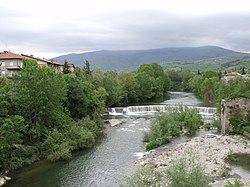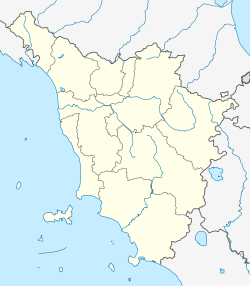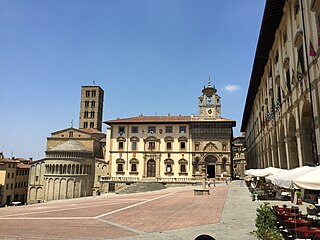
Arezzo is a city and comune in Italy and the capital of the province of the same name located in Tuscany. Arezzo is about 80 kilometres southeast of Florence at an elevation of 296 metres (971 ft) above sea level. As of 2022, the population was about 97,000.

Città di Castello ; "Castle Town") is a city and comune in the province of Perugia, in the northern part of Umbria. It is situated on a slope of the Apennines, on the flood plain along the upper part of the river Tiber. The city is 56 km (35 mi) north of Perugia and 104 km (65 mi) south of Cesena on the motorway SS 3 bis. It is connected by the SS 73 with Arezzo and the A1 highway, situated 38 km (23 mi) west. The comune of Città di Castello has an exclave named Monte Ruperto within Marche.
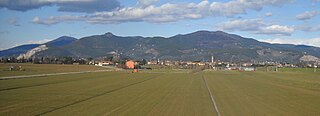
The province of Pisa is a province in the Tuscany region of central Italy. Its capital is the city of Pisa. With an area of 2,448 square kilometres (945 sq mi) and a total population of 421,642, it is the second most populous and fifth largest province of Tuscany. It is subdivided into 37 comuni.

Castiglion Fiorentino is a small, walled city in eastern Tuscany, Italy, in the province of Arezzo, between the cities of Arezzo and Cortona. It is known for its annual festivals and its Etruscan archeological site.

Anghiari is a hill town and municipality (comune) in the Province of Arezzo, Tuscany, Italy.

Castiglione di Garfagnana is a medieval walled town and comune of 1,878 inhabitants in the province of Lucca. It sits on a hillside above the river Esarulo, a tributary of the Serchio.

Sansepolcro, formerly Borgo Santo Sepolcro, is a town and comune founded in the 11th century, located in the Italian Province of Arezzo in the eastern part of the region of Tuscany.

Foiano della Chiana is a small agricultural town in eastern Tuscany, in the province of Arezzo, between the cities of Sinalunga and Cortona. It is well known for its annual carnival.

Bucine is a comune (municipality) in the Province of Arezzo in the Italian region Tuscany, located about 45 kilometres (28 mi) southeast of Florence and about 20 kilometres (12 mi) west of Arezzo.

Castiglion Fibocchi is a comune (municipality) in the Province of Arezzo in the Italian region Tuscany, located about 50 kilometres (31 mi) southeast of Florence and about 12 kilometres (7 mi) northwest of Arezzo.

Loro Ciuffenna is a comune (municipality) in the Province of Arezzo in the Italian region Tuscany, located about 40 kilometres (25 mi) southeast of Florence and about 25 kilometres (16 mi) northwest of Arezzo.

Lucignano is a comune (municipality) in the Province of Arezzo in the Italian region Tuscany, located about 70 kilometres (43 mi) southeast of Florence and about 25 kilometres (16 mi) southwest of Arezzo.

Marciano della Chiana is a comune (municipality) in the Province of Arezzo in the Italian region Tuscany, located about 70 kilometres (43 mi) southeast of Florence and about 20 kilometres (12 mi) southwest of Arezzo.

Ortignano Raggiolo is a comune (municipality) in the Province of Arezzo in the Italian region Tuscany, located about 40 kilometres (25 mi) southeast of Florence and about 25 kilometres (16 mi) northwest of Arezzo.

Poppi is a comune (municipality) in the Province of Arezzo in the Italian region Tuscany, located about 40 km east of Florence and about 30 km northwest of Arezzo.

Buonconvento is a comune (municipality) in the Province of Siena in the Italian region Tuscany, located about 70 kilometres (43 mi) south of Florence and about 25 kilometres (16 mi) southeast of Siena in the area known as the Crete Senesi. It is a member of the I Borghi più belli d'Italia association.

Capalbio is a comune (municipality) in the Province of Grosseto in Tuscany, Italy, located about 150 kilometres (93 mi) south of Florence and about 45 kilometres (28 mi) southeast of Grosseto. Capalbio borders the following municipalities: Manciano, Montalto di Castro (Lazio) and Orbetello. It is a member of the I Borghi più belli d'Italia association.
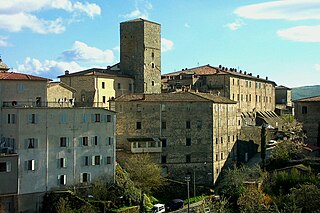
Santa Fiora is a comune (municipality) in the Province of Grosseto, in the Italian region of Tuscany, located about 110 kilometres southeast of Florence and about 40 km (25 mi) east of Grosseto. Santa Fiora borders the following municipalities: Abbadia San Salvatore, Arcidosso, Castel del Piano, Castell'Azzara, Piancastagnaio, Roccalbegna, and Semproniano. It is a member of the I Borghi più belli d'Italia association.

Tuscan wine is Italian wine from the Tuscany region. Located in central Italy along the Tyrrhenian coast, Tuscany is home to some of the world's most notable wine regions. Chianti, Brunello di Montalcino and Vino Nobile di Montepulciano are primarily made with Sangiovese grape whereas the Vernaccia grape is the basis of the white Vernaccia di San Gimignano. Tuscany is also known for the dessert wine Vin Santo, made from a variety of the region's grapes. Tuscany has forty-one Denominazioni di origine controllata (DOC) and eleven Denominazioni di Origine Controllata e Garantita (DOCG). In the 1970s a new class of wines known in the trade as "Super Tuscans" emerged. These wines were made outside DOC/DOCG regulations but were considered of high quality and commanded high prices. Many of these wines became cult wines. In the reformation of the Italian classification system many of the original Super Tuscans now qualify as DOC or DOCG wines but some producers still prefer the declassified rankings or to use the Indicazione Geografica Tipica (IGT) classification of Toscana. Tuscany has six sub-categories of IGT wines today.

Siena is a city in Tuscany, Italy. It is the capital of the province of Siena. Siena is the 12th largest city in the region by number of inhabitants, with a population of 53,062 as of 2022.
